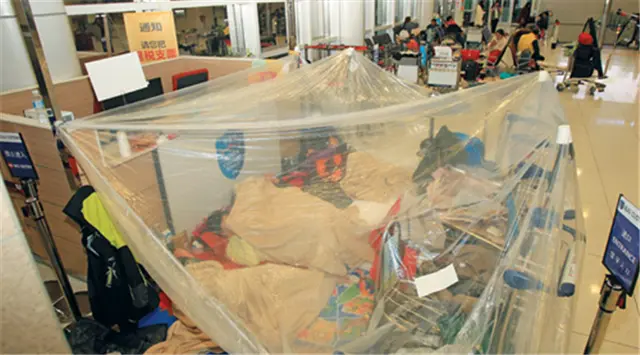(THE CHOSUNILBO)A snowstorm over the weekend closed down Jeju International Airport from Saturday to Monday, trapping 76,000 visitors on the southern resort island.
Even if flights resume on Monday evening, airport authorities believe it will take another two to three days before all of the stranded visitors get to leave.
The daytime low in Seoul dipped to -18 degrees Celsius on Sunday, the coldest in 15 years, causing water pipes to freeze in many homes, while heavy waves halted ferry services along coastal regions.
Jeju saw up to 26 cm of snow, grounding all flights from 5:50 p.m. on Saturday. It was the first time in 32 years that Jeju had more than 10 cm of snow.
Island authorities grounded all flights until 8 p.m. Monday, causing the airport to be closed down for 50 hours. Some 296 flights were canceled on Saturday, 517 on Sunday and 390 on Monday.
The Ministry of Land, Infrastructure and Transport said it was the first time that Jeju airport was closed down that long and it will take another two to three days until all of the stranded visitors can be flown out after flights resume.
Meanwhile, Ulleung Island in the remote East Sea saw more than 130 cm of snowfall from Tuesday until Saturday, closing off roads and halting two regular ferries since last Monday. Around 1,000 Ulleung residents who traveled to the mainland have been unable to return.
According to the Ministry of Public Safety and Security, the icy temperatures and heavy snowfall had grounded 814 flights at airports across the nation as of 11 p.m. Sunday, while 80 ferries traveling to Jeju and Incheon have been halted.
Also, 21 national parks have been closed to the public, including Mt. Sorak and Mt. Odae.
In Seoul the mercury also dipped to -18 degrees in Seoul on Sunday morning, while temperatures fell to -16.4 degrees in Sokcho, Gangwon Province and -6.4 degrees in Seogwipo, Jeju, the lowest on record.
But the cold is expected to ease on Tuesday. The morning low dipped to -14 degrees in Seoul and -8 degrees in Busan on Monday, while many regions will see mercury levels hover below freezing during the day.
The Korea Meteorological Administration said the cold spell should ease on Tuesday with morning lows of -6 degrees in Seoul, the average for the time of year.
Temperatures in February are expected to be similar to previous years or higher, sending average temperatures this winter higher than normal due to the El Niño phenomenon, which warms seawater near the equator and causes unusually hot weather.
 简体中文
简体中文

